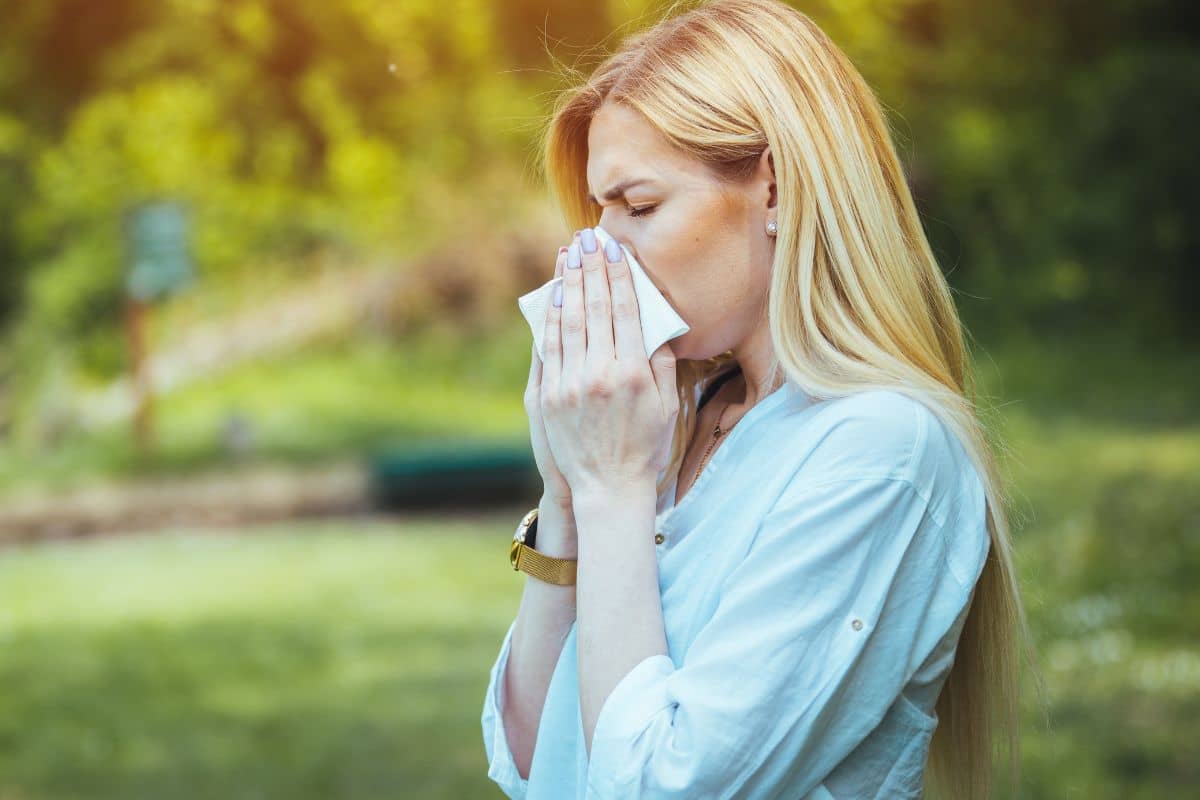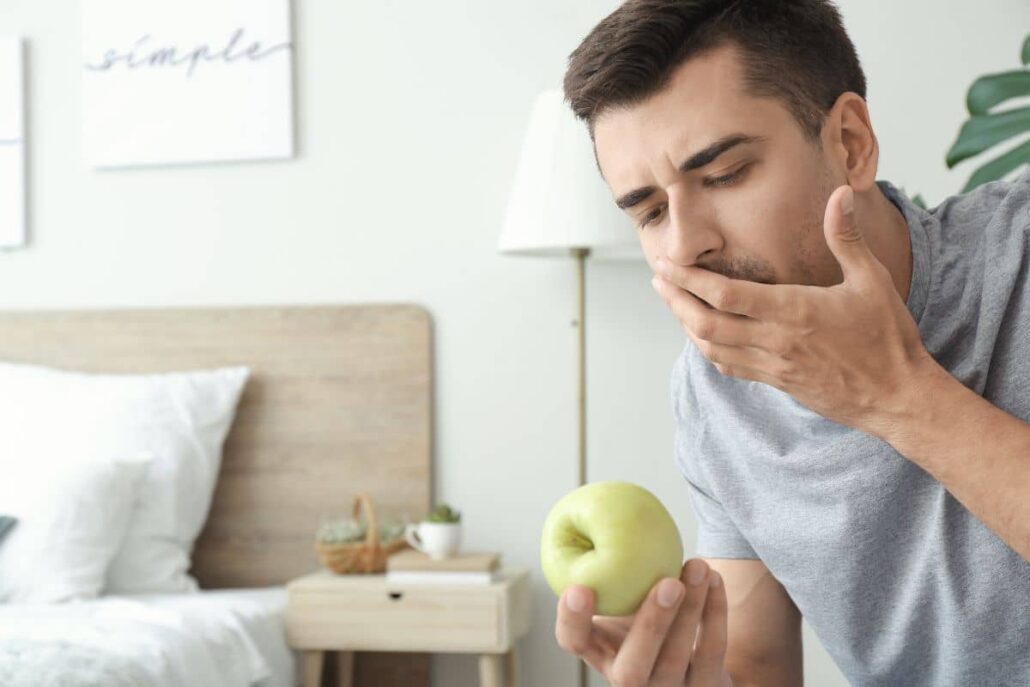The information provided below and throughout this website is presented for general educational purposes only and does NOT constitute professional medical advice. This information is NOT a substitute for professional medical advice and NO material on this site is intended to be a substitute for professional medical advice. Always seek the guidance of your doctor or other qualified health professional with any questions you may have regarding a health or a medical condition. Never disregard the advice of a medical professional or delay in seeking it because of something you have read on this website.
As spring rolls around, it brings with it warmer weather and blossoming trees. For many, this season also marks the start of allergy season, with pollen from trees becoming prevalent in the air. Whether it’s the sneezing fits, itchy eyes, or stuffy noses, pollen allergy symptoms can make even the most beautiful days unbearable. In this article, we’ll dive into the symptoms of pollen allergies, so you can identify them early and seek the right treatment.

Key Insights on Pollen Allergies
- Pollen allergies have similar symptoms, including sneezing, itchy eyes, and a runny nose.
- Grass pollen allergies peak during the summer, while tree pollen allergies are most common in early spring.
- Some allergies are associated with oral allergy syndrome, with symptoms such as itching or swelling in the mouth and throat.
- Allergy testing and treatments like allergy shots are available at Becker ENT & Allergy to help manage symptoms effectively.
- Early treatment for pollen allergies is important to prevent worsening symptoms and potential complications like asthma.
Grass Pollen Allergy
Grass pollen allergies are among the most common seasonal allergies, especially during the late and early summer months. When grass pollen is released into the air, it can trigger allergic reactions in sensitive individuals. Some areas may experience higher pollen counts than others, such as rural areas or areas with a lot of grassy fields, golf courses, and parks.
Symptoms of Grass Allergy
If you’re suffering from pollen allergy, you may experience typical hay fever symptoms, which can include:
- Itchy and watery eyes
- Runny or stuffy nose
- Frequent sneezing
- Coughing and wheezing
- Skin rash
- Headaches
- Sinus pressure
- Dizziness (Eustachian tube inflammation)
- Itchy, watery eyes
- Runny or stuffy nose
- Sneezing
- Coughing/wheezing
These symptoms can also trigger asthma in individuals who are sensitive, leading to more severe difficulty breathing. It’s essential to recognize the signs of pollen allergies early so you can start managing them before they escalate.
Oak Pollen Allergy Symptoms
Oak trees are beautiful, but their pollen is also a common allergen. Oak pollen allergy is most prominent in early spring, making the timing of symptoms different from those of grass pollen allergies. Areas with many oak trees, such as wooded or suburban areas, tend to experience higher pollen counts during the oak tree pollen season. The symptoms of oak pollen allergy often overlap with those of grass pollen allergies.
As with grass pollen allergies, oak pollen allergies can exacerbate existing asthma symptoms, potentially leading to more severe respiratory issues. It’s important to seek treatment early, especially if you are prone to asthma.
Birch Pollen Allergy Symptoms
Birch pollen allergies are most common in the early spring, often overlapping with oak pollen season. Birch trees are typically found in wooded areas and forests, but they are also common in urban areas, making it important to be aware of their pollen count in your area.
Oral Allergy Syndrome (OAS) and Birch Pollen
One distinctive feature of birch pollen allergies is a condition known as Oral Allergy Syndrome (OAS). OAS occurs when certain foods cause an allergic reaction due to their similarity to birch pollen proteins. Symptoms of OAS include:

- Itching or swelling in the mouth or throat
- Hives
- Swelling in the face or lips
Foods that commonly trigger OAS include apples, carrots, celery, and hazelnuts. While these foods may not seem like allergens, the body mistakes them for birch pollen, causing uncomfortable symptoms.
Other Symptoms of Birch Trees Allergy
In addition to OAS, birch pollen allergies can cause typical allergic reactions, such as:
- Sneezing
- Nasal congestion
- Itchy, watery eyes
- Fatigue
Concerned about your exposure to pollen?
Let our experts at Becker ENT & Allergy help you identify your triggers and manage your symptoms. Visit us in New Jersey and Philadelphia.
How to Differentiate Between Grass, Oak, and Birch Pollen Allergy Symptoms
While grass, oak, and birch pollen allergies share many of the same symptoms, there are a few key differences to note:
- Grass pollen allergies tend to peak in late spring and early summer.
- Oak pollen allergies are most common in early spring.
- Birch pollen allergies are most common in early spring.
Factors Contributing to Grass and Trees Pollen Allergies
Several factors contribute to the severity of tree pollen allergies. Genetics play a significant role, as those with a family history of allergies or asthma are more likely to develop them. Environmental factors, like exposure to high pollen counts and pollution, can also worsen symptoms. Additionally, lifestyle choices like spending a lot of time outdoors during peak pollen season can increase the likelihood of suffering from these allergies.
Treatments and Solutions at Becker ENT & Allergy
At Becker ENT & Allergy, we offer a range of allergy treatments tailored to your specific needs. Our team of experienced ENT doctors is committed to finding the right solutions to alleviate your symptoms and help you breathe easier. Treatment options may include:
- Allergy testing to identify specific allergens, including grass, oak, and birch pollen.
- Customized treatment plans, which may include antihistamines, nasal sprays, or allergy shots.
- Asthma management, if your allergy symptoms trigger breathing problems.
- Allergy shots, also known as immunotherapy, can gradually reduce sensitivity to specific allergens and provide long-term relief.
By choosing Becker ENT & Allergy, you’re selecting a practice that values personalized care and long-term solutions to pollen allergies.

Don’t Wait for Symptoms to Worsen
If you’ve noticed symptoms like sneezing, a stuffy nose, or itchy eyes, don’t wait for them to get worse. Early intervention can prevent more severe reactions and help you enjoy the spring season without the discomfort of allergies. At Becker ENT & Allergy, we’re here to help you feel better, faster. Schedule a consultation today and start your journey toward allergy relief.
Why Choose Becker ENT & Allergy
Becker ENT & Allergy is staffed with a team of highly qualified and experienced Allergy doctors who specialize in treating pollen allergies. Our commitment to providing expert care and personalized treatment plans sets us apart from other practices. We use the latest diagnostic tools to identify your allergens and offer a variety of treatment options, including allergy shots and immunotherapy, to help you manage your symptoms and improve your quality of life.

